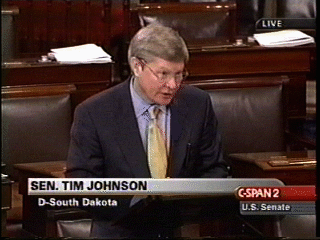
Two days after suffering an apparent stroke, Senator Tim Johnson of South Dakota is recovering in the Intensive Care Unit of George Washington University Hospital, having undergone what appears to have been successful brain surgery. As it turned out, Senator Johnson did not, in fact, suffer a stroke, but instead fell victim to a congenital defect called an arteriovenous malformation, that is essentially a tangle of malformed blood vessels. While it will be some time before Johnson would be back on his feet in a best case scenario, his initial prognosis is tentatively positive. (Nonetheless, this can only be a frightening time for the senator and his family, and I wish them the very best, along with a speedy recovery.)
As has been widely reported, the ramifications of Senator Johnson's incapacitation or death would be significant with regard to the balance of power in the Senate. While the November elections pushed the Democrats into a 51-49 majority, if Johnson is unable to complete his term, South Dakota Governor Mike Rounds, a Republican who would appoint his replacement, could pick a fellow member of the GOP to fill the seat until the next election in 2008. Such an appointment would result in a 50-50 partisan split within Congress' upper house, and maintain GOP control through Vice President Dick Cheney's tie-breaking vote.
From the perspective of the types of legislation that move through the Senate, such a shift might not, in fact, be earth-shattering; historically, it has been difficult to fully control the agenda of the Senate without a margin of significantly greater size than two votes. The House of Representatives would remain firmly in Democratic hands, and it is likely that that would be enough to at least set the tone for the types of laws that would pass through Congress. Where a potential restoration of Republican control truly matters however, would be in the role of oversight.
As Senator Patrick Leahy of Vermont expressed in a speech at Georgetown University Law Center:
While legislation and laws are unquestionably important, at this point in time, what is even more crucial to the country is a restoration of Congress' role as watchdog. Senator Leahy, the incoming Chair of the Senate Judiciary Committee, has promised just such oversight, but he will only be able to deliver if the Democrats retain control of the Senate. Without that control, the egregious Arlen Specter will once again preside over the Judiciary Committee, a position he has used consistently to rubber stamp the wishes of the Bush Administration and to undermine Congressional authority.This Administration has rolled back open government laws and systematically eroded Americans’ privacy rights. It has brazenly refused to answer the legitimate oversight questions of the public’s duly elected representatives, and it has acted outside lawful authority to wiretap Americans without warrants, and to create databanks and dossiers on law-abiding Americans without following the law and without first seeking legal authorization. This White House has behaved as if the Constitution begins with Article II* and they have taken their extreme ideology of a “unitary executive” to strip both Congress and our independent federal judiciary of their rightful roles.
The constitutional balance must be restored. Congress has a solemn duty to protect the rights of the American people and to perform meaningful oversight to make sure the laws are followed. Real oversight makes government more accountable and more effective in keeping us safe.
Fortunately, while there has been somewhat hopeful speculation in some quarters about the possibility that the Republicans could maintain control of the Senate at the expense of Senator Johnson, it appears Governor Rounds would only be able to fill his seat if it were vacant. Since there is no federal provision for forcing the senator to vacate, and the definition of "incapacitation" - a circumstance that might allow for vacating the seat under South Dakota law - is vague, this is unlikely to occur.
As long as Senator Johnson recovers from his surgery, or at a minimum does not resign, there is ample precedent for his maintaining the office to which he was elected. That is good news for the nation, and we can only hope that the news is as good for the senator and his family as he recuperates.
* This is a reference to the fact that the Constitution begins with the legislature - not the presidency - in Article I.
No comments:
Post a Comment